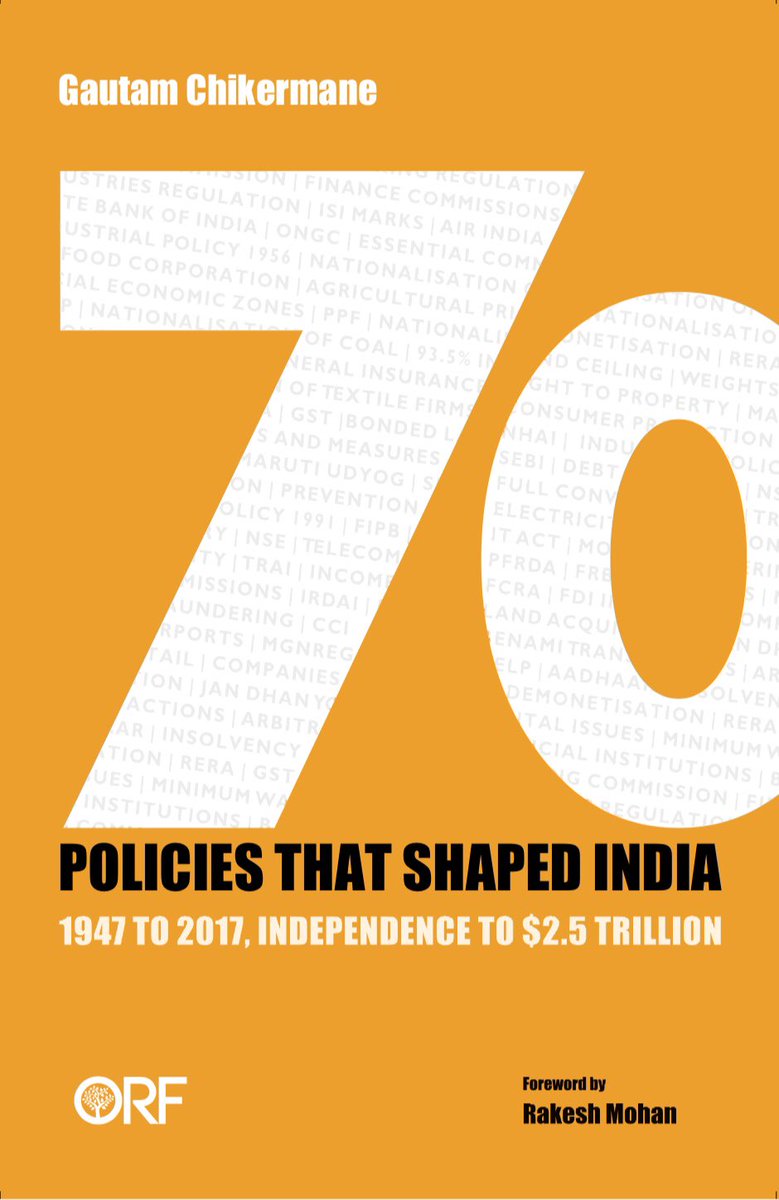A thread that captures all the #70Policies follows...
You may download the book — 70 Policies that Shaped India: 1947 to 2017, Independence to 2.5 Trillion — here goo.gl/dA8QrQ via @orfonline
You may download the book — 70 Policies that Shaped India: 1947 to 2017, Independence to 2.5 Trillion — here goo.gl/dA8QrQ via @orfonline

1/70
By ensuring that prices of shares were kept low, the Controller of Capital Issues ensured gains to small investors. But this meant enterprises were not able to get the right value
Download #70Policies here goo.gl/dA8QrQ via @orfonline
By ensuring that prices of shares were kept low, the Controller of Capital Issues ensured gains to small investors. But this meant enterprises were not able to get the right value
https://twitter.com/orfonline/status/1024939107238043649
Download #70Policies here goo.gl/dA8QrQ via @orfonline
2/70
The Minimum Wages Act is not the end of all wages-related laws. There are four other Central laws that oversee wages. These need legislative consolidation
Download #70Policies here goo.gl/dA8QrQ via @orfonline
The Minimum Wages Act is not the end of all wages-related laws. There are four other Central laws that oversee wages. These need legislative consolidation
https://twitter.com/orfonline/status/1024935334159691777
Download #70Policies here goo.gl/dA8QrQ via @orfonline
3/70
The Factories Act ensures that working conditions of Indian labour are humane. But in an era of #AI and robotics, it may push capital away from labour
Download #70Policies here goo.gl/dA8QrQ via @orfonline
The Factories Act ensures that working conditions of Indian labour are humane. But in an era of #AI and robotics, it may push capital away from labour
https://twitter.com/orfonline/status/1024927783833616384
Download #70Policies here goo.gl/dA8QrQ via @orfonline
4/70
The role of development finance institutions in the closed, pre-liberalisation India was noteworthy; in a relatively more open, liberalising India, they have a limited role
Download #70Policies here goo.gl/dA8QrQ via @orfonline
The role of development finance institutions in the closed, pre-liberalisation India was noteworthy; in a relatively more open, liberalising India, they have a limited role
https://twitter.com/orfonline/status/1024969306470326272
Download #70Policies here goo.gl/dA8QrQ via @orfonline
5/70
The Banking Regulation Act now needs to evolve towards regulating electronic and mobile money, which brings the opportunity to reach the unbanked and the threat from e-criminals
Download #70Policies here goo.gl/dA8QrQ via @orfonline
The Banking Regulation Act now needs to evolve towards regulating electronic and mobile money, which brings the opportunity to reach the unbanked and the threat from e-criminals
https://twitter.com/orfonline/status/1024924008251310080
Download #70Policies here goo.gl/dA8QrQ via @orfonline
6/70
The extra-constitutional Planning Commission steered the economic direction of India for 65 years, imposing its will over Union Budgets and State finances alike
Download #70Policies here goo.gl/dA8QrQ via @orfonline
The extra-constitutional Planning Commission steered the economic direction of India for 65 years, imposing its will over Union Budgets and State finances alike
https://twitter.com/orfonline/status/1025116527908069381
Download #70Policies here goo.gl/dA8QrQ via @orfonline
7/70
The general direction of successive finance commissions has been leaning towards giving States a greater share of resources
Download #70Policies here goo.gl/dA8QrQ via @orfonline
The general direction of successive finance commissions has been leaning towards giving States a greater share of resources
https://twitter.com/orfonline/status/1025108985009950720
Download #70Policies here goo.gl/dA8QrQ via @orfonline
8/70
Industries (Development and Regulation) Act gave the government the power to investigate, assume management control of an enterprise, and take over an enterprise without investigation
Download #70Policies here goo.gl/dA8QrQ via @orfonline
Industries (Development and Regulation) Act gave the government the power to investigate, assume management control of an enterprise, and take over an enterprise without investigation
https://twitter.com/orfonline/status/1025101428224749568
Download #70Policies here goo.gl/dA8QrQ via @orfonline
9/70
The Bureau of Indian Standards Act of 2016 that replaced the ISI Act provides for compensating consumers if a product does not confirm to standards
Download #70Policies here goo.gl/dA8QrQ via @orfonline
The Bureau of Indian Standards Act of 2016 that replaced the ISI Act provides for compensating consumers if a product does not confirm to standards
https://twitter.com/orfonline/status/1025093886979518464
Download #70Policies here goo.gl/dA8QrQ via @orfonline
10/70
#Nationalisation of Air India set the pace for serial nationalisations of several other sectors – notably banking, life insurance, general insurance and mining
Download #70Policies here goo.gl/dA8QrQ via @orfonline
#Nationalisation of Air India set the pace for serial nationalisations of several other sectors – notably banking, life insurance, general insurance and mining
https://twitter.com/orfonline/status/1025267522386501638
Download #70Policies here goo.gl/dA8QrQ via @orfonline
11/70
The impunity of interference in the functioning of public sector banks peaked with the 1976 amendment to State Bank of India Act, enacted to remove its upright Chairman R.K. Talwar
Download #70Policies here goo.gl/dA8QrQ via @orfonline
The impunity of interference in the functioning of public sector banks peaked with the 1976 amendment to State Bank of India Act, enacted to remove its upright Chairman R.K. Talwar
https://twitter.com/orfonline/status/1025539312882987011
Download #70Policies here goo.gl/dA8QrQ via @orfonline
12/70
From “division” to “directorate” to “commission” and finally to a “company”, the evolution of Oil and Natural Gas Corporation has moved with the times
Download #70Policies here goo.gl/dA8QrQ via @orfonline
From “division” to “directorate” to “commission” and finally to a “company”, the evolution of Oil and Natural Gas Corporation has moved with the times
https://twitter.com/orfonline/status/1025524215041204225
Download #70Policies here goo.gl/dA8QrQ via @orfonline
13/70
What the Essential Commodities Act fails to see is that the era of shortages is now well behind us and needs to be amended, if not repealed, to serve this new India
Download #70Policies here goo.gl/dA8QrQ via @orfonline
What the Essential Commodities Act fails to see is that the era of shortages is now well behind us and needs to be amended, if not repealed, to serve this new India
https://twitter.com/orfonline/status/1025509114699501568
Download #70Policies here goo.gl/dA8QrQ via @orfonline
14/70
So firmly was socialism etched in India that following the Industrial Policy Resolution, intellectuals advised businesses to map out a course of action consistent with the government’s
Download #70Policies here goo.gl/dA8QrQ via @orfonline
So firmly was socialism etched in India that following the Industrial Policy Resolution, intellectuals advised businesses to map out a course of action consistent with the government’s
https://twitter.com/orfonline/status/1025648545473294338
Download #70Policies here goo.gl/dA8QrQ via @orfonline
15/70
“Nationalisation of life insurance is an important step in our march towards a socialist society. Its objective will be to serve the individual as well as the State.”
—Jawaharlal Nehru
Download #70Policies here goo.gl/dA8QrQ via @orfonline
“Nationalisation of life insurance is an important step in our march towards a socialist society. Its objective will be to serve the individual as well as the State.”
—Jawaharlal Nehru
https://twitter.com/orfonline/status/1025660367106584576
Download #70Policies here goo.gl/dA8QrQ via @orfonline
16/70
Building institutions is hard, maintaining them is even harder: in 2018 global university rankings of 950 universities, only Delhi (rank: 172) and Bombay (rank: 179) figured in top 200
Download #70Policies here goo.gl/dA8QrQ via @orfonline
Building institutions is hard, maintaining them is even harder: in 2018 global university rankings of 950 universities, only Delhi (rank: 172) and Bombay (rank: 179) figured in top 200
https://twitter.com/orfonline/status/1025668945439670273
Download #70Policies here goo.gl/dA8QrQ via @orfonline
17/70
Politically, economically and administratively, Food Corporation of India must rid itself of the dangerous situation of “huge surplus in FCI godowns coupled with widespread hunger”
Download #70Policies here goo.gl/dA8QrQ via @orfonline
Politically, economically and administratively, Food Corporation of India must rid itself of the dangerous situation of “huge surplus in FCI godowns coupled with widespread hunger”
https://twitter.com/orfonline/status/1025679495489941504
Download #70Policies here goo.gl/dA8QrQ via @orfonline
18/70
Despite the use of MSP through the Commission for Agricultural Costs and Prices, India is a ‘food grains secure’ country but not ‘food secure’—this anomaly needs to be addressed
Download #70Policies here goo.gl/dA8QrQ via @orfonline
Despite the use of MSP through the Commission for Agricultural Costs and Prices, India is a ‘food grains secure’ country but not ‘food secure’—this anomaly needs to be addressed
https://twitter.com/orfonline/status/1025718891182354433
Download #70Policies here goo.gl/dA8QrQ via @orfonline
19/70
Implementing SEZ Act is difficult as different governments have varying objectives—Karnataka wants foreign investment, Tamil Nadu large dividends, Andhra Pradesh employment generation
Download #70Policies here goo.gl/dA8QrQ via @orfonline
Implementing SEZ Act is difficult as different governments have varying objectives—Karnataka wants foreign investment, Tamil Nadu large dividends, Andhra Pradesh employment generation
https://twitter.com/orfonline/status/1025727761405472768
Download #70Policies here goo.gl/dA8QrQ via @orfonline
20/70
There is urgent need for an extremely low-cost but market-linked long-term investment product. Until then, Public Provident Fund will remain the backbone of small savers
Download #70Policies here goo.gl/dA8QrQ via @orfonline
There is urgent need for an extremely low-cost but market-linked long-term investment product. Until then, Public Provident Fund will remain the backbone of small savers
https://twitter.com/orfonline/status/1025736958264238081
Download #70Policies here goo.gl/dA8QrQ via @orfonline
• • •
Missing some Tweet in this thread? You can try to
force a refresh





